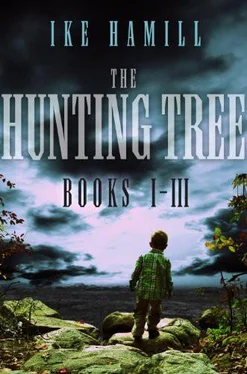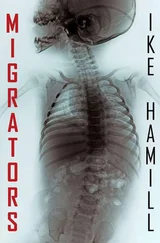“Well,” Dr. Stuart sighed. “That’s a pretty hard one. We’re doing a lot of tests to figure that out, but it’s mostly because if we could find something early it would be a lot easier to deal with. Do you know what I mean?”
Davey nodded.
“Your last doctor, Chisholm, he figured that given the fact that you stumble sometimes, and your early development, maybe you had inherited a condition. So, we’re going to do some more tests on all the blood we took and see if there’s anything we can find. That’s not what you’re really worried about, is it?”
“No,” Davey admitted. He bunched his shoulders up and lowered his head.
Dr. Stuart suppressed the urge to prod him further, and just waited for a response.
“Sometimes I have dreams, but I’m afraid to talk about them,” said Davey.
“Why’s that?”
“‘Cuz What if then they come true?”
Dr. Stuart nodded and frowned. “That’s a perfectly reasonable thing to be afraid of, Davey. Lots of people have that exact same fear, and it’s okay to be careful about what you say. But can I tell you something else? Sometimes dreams get a lot less scary when you tell them to someone else. I had to study a lot of science to become a doctor and we learned that nobody has ever shown any causal link between telling a dream and it coming true.”
Davey nodded.
“My dad understood how these things work. He was telling me about everything, but then he died,” said Davey.
“Would you like to have someone else to talk to? There are people who specialize in just that—they’re really good listeners and they make a job of helping people understand their thoughts and dreams and stuff,” said Dr. Stuart.
“Like a shrink?”
Dr. Stuart laughed. “Yeah. Exactly like that.”
“I don’t know,” said Davey. “I’ve heard they’re expensive.”
“Don’t worry about that,” said the doctor. “If I can prescribe it, most of the cost will be covered by the insurance company. If we have a problem with getting the money, then we won’t do it. Do you want me to do that?”
“I guess,” said Davey, rubbing his neck.
“Now, is there anything else you can tell me about physically?” asked Dr. Stuart. “Any aches, pains, balance problems, anything?”
“My chest still hurts when I move too fast,” said Davey.
Dr. Stuart nodded vigorously. “Yup, you can expect that for at least another couple of weeks. I think you’ll be ready to go back to school by next week though. You can play just as hard as you want, but you let me know if you have any more pain after,” he said and looked up at the calendar, “let’s say April first. If you feel any more pains after then, tell your mom and ask her to let me know.”
“Okay,” said Davey.
“What else?”
“I don’t like the way I smell,” said Davey.
“Okay, good. That’s normal for a boy your age. You might be a tiny bit ahead of the curve on that one, but everyone is different. I’m going to ask your mom to pick you up some special deodorant if you don’t mind. I just want you to make sure you stay away from antiperspirant for now, okay?”
“Sure,” Davey said.
“What else?” Dr. Stuart prompted again.
Davey shrugged and held up his hands.
“Okay, great!” The doctor slapped his knee and stood up. I’m going to talk to your mom for a couple of minutes about the blood tests and everything. I’ll also tell her that I would like you to have someone to talk to, is that okay?”
“Sure,” said Davey.
Dr. Stuart led Davey out to the waiting room and waved Melanie towards his office.
“How’s he doing? Sorry I was so dense,” said Melanie.
“Don’t worry about it,” the doctor said, smiling. “He’s good. Very smart boy, but you know that. I didn’t really get a chance to know him last time with all that hospital stuff going on.”
“Is there something he’s not telling me?”
“Well,” said the doctor. “I think he needs someone to talk to. Honestly, he still misses Dad, which is perfectly normal. It’s also normal for him to have some feelings about Dad that he can’t talk to Mom about. I’m going to write down a couple of names of colleagues I trust. Insurance can be tricky on this. I can write it up as necessary based on his injury, or any conditions we might find, but if you’re planning on switching carriers at any time, it might alert as a pre-existing condition. You might just want to consider on a couple hours a month out of pocket, depending on how much it costs and how much you have to spare.”
“Okay,” said Melanie. “That’s a lot to take in, but I have seen that he needs to talk to someone.”
“I’m also going to write down this product for you,” said Dr. Stuart.
“A prescription?” Melanie wrinkled her brow. She was willing to accept some minor counseling, but didn’t like the idea of medicating kids who had trouble sleeping.
“No.” Dr. Stuart laughed. “It’s a deodorant. This one is mild and natural and it smells like fresh laundry. Should help him blend in a little better.”
“Oh.” Melanie exhaled.
“I know,” said the doctor. “It’s hard to accept your little boy is growing up so fast. Finally, we should talk about the tests.”
“You have results?” she asked, confused.
“No, not yet. But I want to make sure that when we get the results we have the right set of eyes looking at them.”
“Of course,” agreed Melanie.
“Here’s the thing: as you may have already guessed, I’m not the biggest fan of the insurance companies.”
“Who is?” she asked.
“In your case, if I refer you to someone in your network to analyze these results, we’re not going to get the most detailed, informed answers,” said Dr. Stuart.
“No?”
“Unfortunately not.”
“Then what?” Melanie asked.
“I’d like to bring in an old friend of mine. He strictly a research guy, he doesn’t have patients—more like IDs on a clipboard, but I’m thinking that if anyone can give us an answer, it will be him.”
“Okay,” said Melanie, but she chewed on a fingernail.
“That makes you nervous?”
“A little?”
“If we don’t get good answers—something we can fully test and prove out—we’ll go straight on to one of the doctors in your network and go a more conventional route.”
“I trust you, Dr. Stuart. I feel like you’re being straight with me. Let’s give it a shot,” said Melanie.
“Okay, great,” he said. “I’ll get his schedule and have reception get in touch.”
“Thank you,” said Melanie.
AFTER THE DEPOSITION, Mike rode north on I-93 into the mountains of New Hampshire. He tried to focus on his finances—he was convinced that there must be some way he could pay off his loans and the damages he owed, and still have enough money to live. His bank account painted a bleak picture. It had steadily declined since the day Gary died. In the fire, Mike had lost his van, his equipment, all the findings that supported his research, and his friend. All that he had left were debts, legal bills, and hateful phone calls from Gary’s family.
The urge to flee had been overwhelming. Until he passed through Manchester he hadn’t realized what should have been perfectly obvious: he was headed directly towards the energy source that Gary had pinpointed. Mike took this as a sign from his subconscious and stopped at a gas station to spend most of his cash buying a map and filling up his thirsty vehicle. Before the pump clicked off, he had already found the town, the road, and the trail where Gary’s lines had intersected.
He took the exit written on his pad, and stopped at the first intersection. A big truck with giant tires pulled up behind him and honked its throaty horn. Mike waved the driver around and pulled the map into his lap. Studying the lines, he turned the map around several times, trying to construct directions to the trailhead.
Читать дальше











